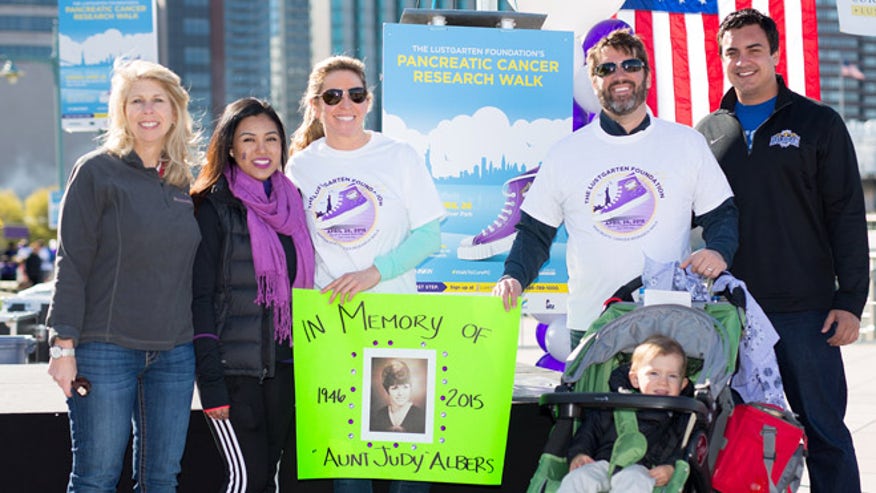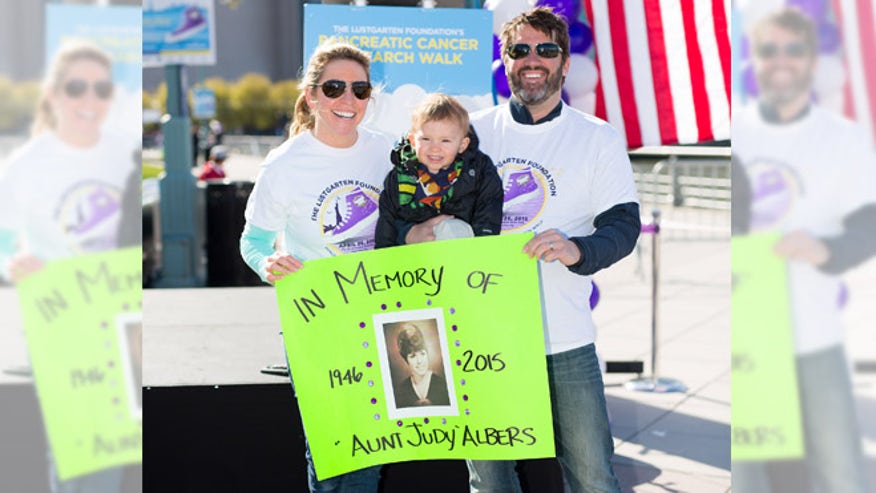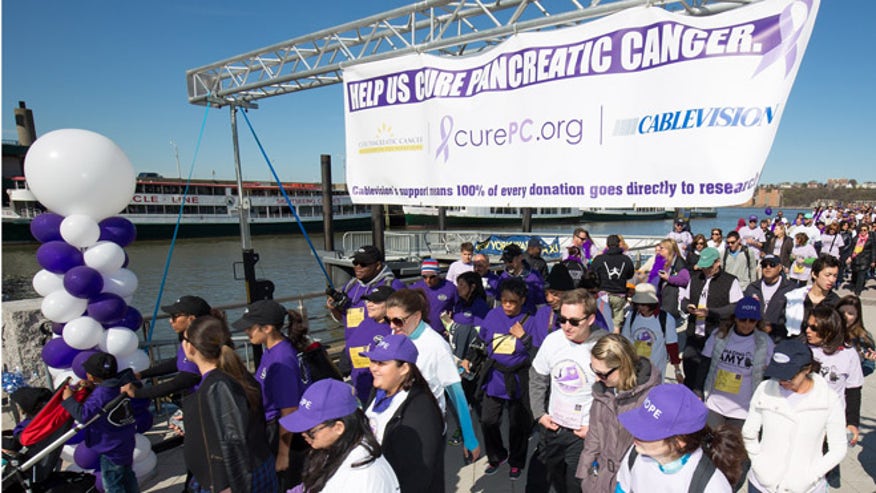How many times have you seen an ad for a walk to help raise money for a cause, and thought how nice it would be to take part, but didn’t have the time? Or perhaps, you would rather donate and send in a check since the cause was something near and dear to your heart? I have seen those ads countless times too. Calls were made, checks were donated, but sneakers were never laced up and put to use for a fundraising foot journey. That is, until recently, when I walked along with my husband Kenny and 2-year-old son, Jackson, in honor of my beloved Aunt Judy who passed away just over a month ago from pancreatic cancer.
Pancreatic cancer was something I knew little about until this “silent killer,” as it is known, came into our lives with devastating speed and took someone we loved, so much, away, so quickly.
I first learned of The Lustgarten Foundation’s Pancreatic Cancer Research Walk in New York City through an ad in a free newspaper while riding the subway to work. I spotted the bright purple tennis shoe on the page, then honed in on the words “pancreatic cancer.” I often see ads for breast cancer walks, AIDS, March of Dimes, etc., but this was the first time I had seen something for pancreatic cancer.
I was fresh into dealing with pancreatic cancer, or “PC,” when my mom’s sister was diagnosed in December of 2014. I tore out the page, brought it to work, and taped it to my desk to keep myself honest. I wanted to do this for Judy, my family, and for everyone else who has been touched by this disease, while helping to raise money to help find a cure and for tests to help diagnose the disease sooner.
Doctors will tell you, as they did with Aunt Judy, that pancreatic cancer has a poor prognosis. It is rarely detected in its earliest stages and the majority of people are diagnosed at stage 4 once it has already metastasized. Those factors combined make this type of cancer one of the leading causes of cancer death. By the time you show symptoms or signs, the cancer is usually so advanced that surgical removal is not possible.
I will never forget flying to my hometown of Sacramento in December to be with Aunt Judy and my mother at the oncologist’s office to hear the news. The oncologist came in, pulled up a stool, looked Judy right in the eye, and told her that her test results revealed that she had stage 4 pancreatic cancer. It had spread, and it was everywhere. With chemo, she might get a few months, maybe weeks. There would be no surgery to remove the tumor, there would be no real chance. It was devastating.
The months that followed were painful and hard, but much to Judy’s credit, she kept her spirits up and never complained. Not once. She instead used her time to talk about the good times and kept nurses, caregivers and friends laughing at her jokes. She was a funny woman with a Lucille Ball-style sense of humor, and will be greatly missed by all who knew her.
I was warned this walk would be an emotional day, and it was. Kenny, Jackson and I came armed with a sign we made to honor Judy, giving the poster some bling (she would have loved that) with rhinestones in the color purple which signifies the fight against PC. More than 1,500 people came together for The Lustgarten Foundation’s Fifth Annual New York City Pancreatic Cancer Research Walk at Pier 84 along Hudson River Park. It was a beautiful sunny day, and hope was in the air. While folks were stretching out and getting fueled up with bagels and coffee, information was shared from the main stage. The Foundation’s namesake, former Cablevision Vice Chairman Marc Lustgarten, died from PC in 1999 at the age of 52, and due to Cablevision’s support of the foundation, 100 percent of the record-breaking nearly $425,000 raised at the walk will go directly to PC research. Since it began, the New York City walk has raised more than $1.8 million.
Before the walk, I spoke with some incredible people who helped to put the event together – a young PC survivor and a man who lost his mother to the disease, who walked together with a unifying message of hope.
Kerri Kaplan, the Executive Director & Chief Operating Officer of The Lustgarten Foundation pointed out that when the foundation started, there was very little known about the disease.
“You could count on your hands how many researchers we had in 1998, now there are more than 1,000 researchers working on finding a cure for this disease,” she added.
Kaplan said researchers know that early detection is the key to finding a cure.
“We are funding an early detection blood test, as well as better imaging tests, so that people can go to their doctor for a routine doctor visit, to see before they have any symptoms, if there is an elevated biomarker which would show they have early pancreatic cancer,” said Kaplan.
Other advancements being made include the study of genetic makeup of this cancer, the development of new therapies, immunotherapies which are being tested in treating pancreatic cancer and more clinical trials.
Nick Sabino, who lost his mother in 2013 after a two-year battle with pancreatic cancer has been doing this walk since 2011 and is also a curePC campaign participant, which helps raise awareness for the cause. His mother’s road to diagnosis is a heartbreaking one and one that unfortunately happens often.
“She went to the doctor (with back pain) and they told her it was constipation. That was September of 2010, if they would have just done a CT scan then, they could have caught it,” said Sabino. “The pain continued to be annoying, it was her lower back — doctors continue to tell her its constipation and let’s see what happens. She then went back when the pain persisted in February of 2011 — and that’s when someone said let’s do a CT scan. That’s when they discovered the tumor on her pancreas, and a spot on her liver also.”
Sabino says it’s not only personal, but also helps him feel a sense of accomplishment.
“It makes me feel like I’m doing something, I don’t have degrees in biology or oncology, I can’t do the research, but what I can do is walk three miles,” he said. “I can post on Facebook and Twitter, and talk to people and raise money and give that to people who can research the disease.”
Sabino said the walk also does something else: It helps fuel a dream he has had for a long time.
“My dream is that I would wake up and there would be a notification that by some crazy stroke of luck that we came across a cure,” he said. “I would actually dream about the party we would have, I would think about how amazing that would feel to see my mother go to the party instead of chemo.”
Alicia Rivera, another walk participant, has an amazing story of survival. She was diagnosed at 18 with PC, and is now not only a survivor, but is also a nursing student and a curePC campaign participant too. It is very rare to be so young and get that diagnosis and also rare to be a PC survivor. Only 7 percent of those diagnosed with PC survive five years, and an estimated 49,000 Americans will be diagnosed this year, with more than 40,000 of them dying before the year ends, according to the American Cancer Society.
I asked Rivera how she found out she had PC and how she coped with the diagnosis at 18.
“I was young, and so many people said to me they couldn’t believe it. I have Crohn’s disease, and I had my wisdom teeth extracted in October of 2011. I went into septic shock, and that’s when doctors did a scan,” said Rivera. “They found the tumor, and doctors at first thought it couldn’t be PC, but did a biopsy to be sure, and it came it back positive, stage 1 pancreatic cancer.”
Rivera said she was shocked and recalled thinking that she was going to die. Doctors performed surgery to remove half of her pancreas, taking with it her gallbladder, a bile duct, lymph nodes and half of her stomach. They then reconnected her intestines to the remaining portion of her stomach. She said she hopes her story will help others stay connected to their bodies and to be aware of potential warning signs.
“PC is considered the silent killer, because by the time you feel symptoms, the tumor is usually metastasized,” Rivera added. “You need to know your body.”
While the statistics as of now are daunting, Rivera said she likes to think of what this walk will be like in the future.
“That’s the sad part about PC, there’s so many people walking in memory of people, and there are maybe 4-5 survivors … and I hope that one day, when I bring my children, there will be so many more. It’s a fight and we are working for a cure, hopefully one day. Hopefully we’ll get there.”
I, too, hope to see and hear about more survivors in the future. I hope that sharing Judy’s story, and the stories of others, will help people understand more about this disease and remember those who have been lost.
To learn more about PC and the fight to find a cure visit www.curePC.org
Laura Ingle currently serves as a New York-based correspondent for FOX News Channel (FNC) and also frequently anchors FOXNews.com/LIVE. She joined FNC as a Dallas-based correspondent in 2005.




